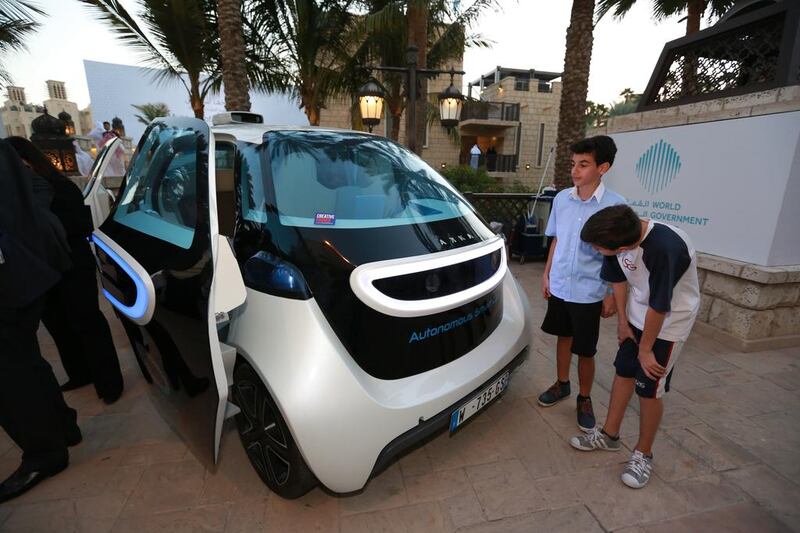ABU DHABI // They may sound like the stuff of science fiction, but driverless cars could be key to reducing the number of accidents in the UAE, experts say.
More than 90 per cent of accidents involve driver error and machines have been proven to drive more reliably than humans, said Lee Woodcock, global product director for intelligent mobility at the engineering consultancy Atkins.
“The potential is particularly acute here in the UAE because there are more than 200 nationalities of people on the roads, with very contrasting driving cultures and expectations,” Mr Woodcock said.
Last April, Sheikh Mohammed bin Rashid, Vice President and Ruler of Dubai, said he would like driverless transport to account for 25 per cent of journeys in the emirate by 2030.
The announcement was made at the second Mena Transport Congress and Exhibition, as a 10-seat driverless vehicle was on a trial run.
“We think the Middle East has the physical, legislative and behavioural attributes to be at the forefront of driverless vehicle adoption,” Mr Woodcock said. “This would offer major benefits, creating safer, cleaner, more competitive and liveable cities.”
A driverless car’s sensor system can detect the road, obstacles, movement of nearby vehicles, edge of the travel lane and the presence of traffic waiting at a light, said Glenn Havinoviski, a US transport expert.
Driverless cars would be good for road safety but “the concept is still in its infancy”, said Michael Dreznes, vice president of the International Road Federation.
“There will be bumps in the road ahead but ultimately, autonomous vehicles will make roads safer in the UAE and everywhere else around the world. Let the industry work out the kinks,” he said.
The challenge is to fully integrate them into traffic with conventional vehicles, and to equip them with technology that lets them “talk” to each other and the road infrastructure.
“Future autonomous vehicles should be ‘connected’ vehicles,” Mr Havinoviski said.
“As vehicles contain more automated features and eventually become driverless, wireless communications between vehicles and the infrastructure, along with other vehicles, will ultimately be very important.”
Driverless vehicles will not be able to predict the behaviour of motorists in conventional ones, or interpret non-verbal communication such as eye contact and hand gestures.
“This is a key challenge which needs to be overcome, and part of the mix is understanding the issues around public acceptability and trust of self-driving cars on roads,” Mr Woodcock said.
“In the shorter term, some environments are particularly well suited to driverless vehicles, and could work for early adoption without needing to mix with self-driving vehicles.”
For example, they could be used in and around major airports, where traffic is closely monitored, regulated and predictable, he said.
Kamui Mahtani, 28, a motorsport enthusiast in Dubai, is unconvinced that the UAE is ready for driverless cars.
“The problem is that you cannot control the behaviour of other people,” he said.
“For instance, there’s an autonomous vehicle alongside the normal one on the road. Maybe the driver of the normal car would do something that the computer could not predict. In that case, I’m not sure it would be safe.”
He was also concerned that owners would try to maintain their driverless vehicles themselves, rather than pay the high cost of maintenance and check-up.
“This would cause errors in the system and pose a crash risk for drivers,” said Mr Mahtani.
Better driving etiquette and courtesy were needed before one could see driverless cars taking over the roads, he said.
“The UAE is home to so many different nationalities, and unfortunately, drivers from certain countries show a lack of courtesy and respect towards fellow drivers.”
rruiz@thenational.ae






